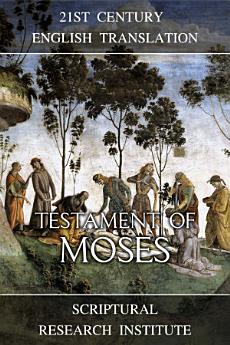Testament of Moses
O ovoj e-knjizi
The Jewish Sect appears to have been apocalyptic, and therefore could be seen as a precursor to Christianity. The surviving version of the Testament of Moses is generally dated to the 1st-century AD at the latest, due to the historic persons it mentions, however, there is some debate as to whether it was composed then or was an older text that was expanded in the 1st-century, however, it has never been accepted as work of Moses or Joshua by Christians or Rabbinical Jews. The only known copy to survive to the present is the 6th-century copy in Latin, which is accepted as a translation from a Koine Greek copy, itself a translation from a Semitic language version, however, it is not clear if it was originally written Hebrew, Aramaic, or Samaritan (Paleo-Hebrew).
The content of the testament places its origin sometime before the destruction of the Second Temple, however, unlike most Jewish texts from the time, it attacks all the priesthoods that inhabited the Second Temple. This means it could not have been a Pharisee or Sadducee work, however, does not clarify if it was a Samaritan work, or the work of another Jewish sect, such as the Tobian Jews (Τουβιανοὺς Ιουδαίους) mentioned in 2nd Maccabees, who lived in Seleucid controlled regions. The attack on Ezra would be equally valid for Samaritans or the followers of the High Priest Tobiah, who Ezra kicked out of the Temple in Jerusalem in the Septuagint's 1st Ezra. The mention of the 10 tribes of Israel not being lost, but continuing to live in Samaria, suggests a Samaritan origin, however, the apocalyptic message seems to point to it originating in the same sect as the Testaments of the Twelve Patriarchs, and the Testament of Job, as well as the books of Enoch, Tobit, Jubilees, and Job, which were likely the work of the Tobian Jews. However, as the Tobian Jews were described as living in Bashan (southern modern Syria), and this was not part of Judah, but rather part of the Tribe of Manasseh's territory, therefore this testament strongly implies that the Tobian Jews were Samaritans, which would explain why most of their texts were never accepted by Rabbinical Jews.











